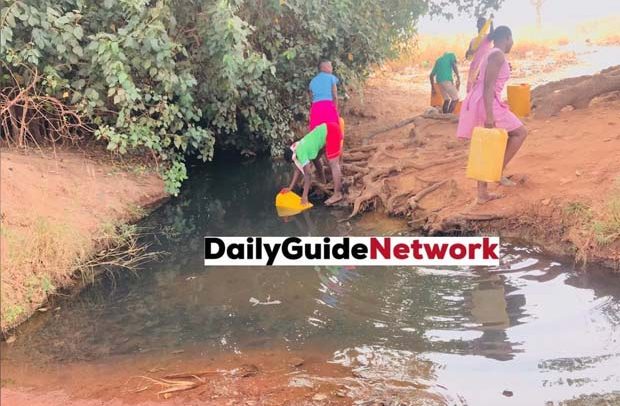The quest to get access to potable water has compelled students of the Nakpanduri Business Senior High School in the Bunkpurugu-Nakpanduri district of the North East region to drink from a polluted stream.
The Nakpanduri Business Senior High School with a population of 894 made up of forms 1&2 does not have a source of potable water for the entire student body for their drinking, cooking, cleaning, washing, and other activities.
The only source of water is a stream located along a dusty road near the school which the students share with the animals.
DGN Online gathered that the school canteen also depends on the polluted water as the boreholes in the school have all dried up.
A visit by DGN Online to the stream saw students with yellow gallons busily fetching the polluted water to be used for various activities.
A student Yussif Zeliatu told DGN Online that they do not have potable water on campus reason why they depend on the stream.
According to her, “even though the water is polluted and unhygienic, as a girl I need clean water to clean myself and wash my clothes especially during my menses but unfortunately, this water is not clean, we can even get infections and other waterborne diseases should we continue using this water.”
She appealed to the government, NGOs, organizations to come to their aid to provide them with potable water.
Another student, Joel Jantong said they spend precious time walking from the school to the stream to fetch water when they could have used that period to learn.
He revealed that most students get sick of typhoid and diarrhea due to the polluted water.
“ We use this water for washing, bathing, and drinking because this is the only source of water we have so we beg the government and anybody who can help to come to our aid.”
Mr. Joseph Suayam Mambelimba, the headmaster of the Nakpanduri Business Senior High School, declined to comment about the matter when DGN Online contacted him.
Meanwhile, the Paramount chief of Nakpanduri, Naba David Kansok, has added his voice to the call on the government to come to the aid of the school.
“ Water is the main headache of this school, the water the students drink they virtually share it with animals which is dangerous and has health complications.”
He called on the government to build a small water system that will supply water to the school and the Nakpanduri township to solve the water crisis in the area.
In 2010, the United Nations general assembly declared that the human right to water entitles everyone to sufficient, safe, acceptable, physically accessible, and affordable water for personal and domestic use. however, the reality is a contravention of the above.
The Sustainable Development Goal
The Sustainable Development Goals (SDGs) VI, which Ghana is a signatory to, talks about ensuring available and sustainable management of water and sanitation for all.
The global effort to achieve sanitation and water for all by 2030 is extending beyond the household to include institutional settings, such as schools, healthcare facilities, and workplaces.
This has been reinforced by global education for all strategies highlighting how water, sanitation, and hygiene (WASH) in schools improves access to education and learning outcomes, particularly for girls, by providing a safe, inclusive and equitable learning environment for all.
FROM Eric Kombat, Nakpanduri


